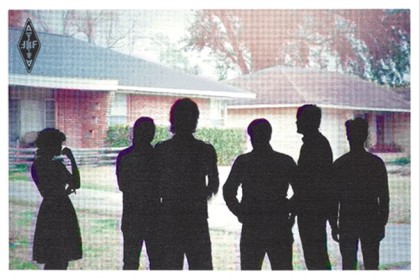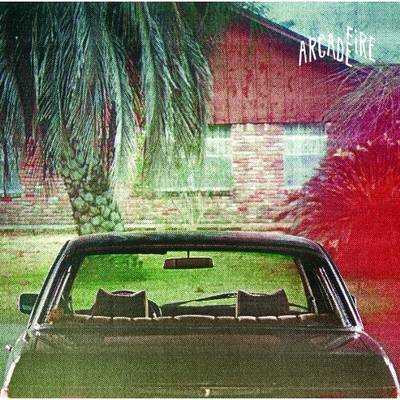Filed under: Music, Volume 003 | Tags: Arcade Fire, Music, Music Review, Sprawl, The Suburbs, Zack Adelson
The ill effects of sprawling settlements development patterns are well documented. Numerous books, articles, and films have discussed the negative physical, economic and ecological impacts associated with suburban sprawl. However, as a medium for expression, the music industry provides few examples of sufficient coverage. Countering this trend is the band Arcade Fire, whose latest album, The Suburbs, brings to life their own experiences growing up in such an environment. In doing so, they paint an eerie, but accessible picture of what many kids go through growing up in America.
The Arcade Fire is an indie rock band formed in Montreal, Canada by husband and wife duo Win Butler and Régine Chassagne. The group also includes Win’s younger brother, William Butler. Win and Will were born in Northern California, near the Nevada border, in a small rural town. When the brothers were young their family moved to the Woodlands, Texas, a well-known master planned suburb on the outskirts of Houston. The change in scenery was so drastic that Win says “it was like landing on Mars.” What was then an unfamiliar new place sets the stages for the hazy memories that comprise The Suburbs.
The central themes of boredom, confinement, loneliness and regret are brought up repeatedly throughout the album. Some of the most powerful imagery in many of the songs is accompanied by the idea of being lost—Win uses this as a metaphor for feeling afloat in life, with no particular direction. But this sense of confusion is also directly related to the disconnected life he once lived in the suburbs. The point is driven home on the album’s most somber song, Sprawl I (Flatland).
The track describes Win’s return visit to the Woodlands neighborhood where he spent the majority of his childhood. But with so little connection to the place he once lived, he is unable to find the right house. More telling is that during the entire song he deliberately avoids the word “home”. Instead, he searches for “the house where we used to stay.” Towards the end of the track Win recalls being asked by a police officer where he lives. He replies that he does not know but has been searching every corner of the Earth.
Beyond being lost in the sprawl, the Butler brothers also seemed to grow up bored. Many of the songs ring with a tone of regret, recalling summer days wasted indoors, germinating half-baked ideas that were never realized. The listener understands that the brothers did not lack creativity, but simply had no outlet for their talents.
Listening deeper into the album, several songs reference a “suburban war,” a metaphor for childhood fantasies enacted through play. From personal experiences, it could have been a neighborhood wide game of flashlight tag or building a skateboard ramp in the backyard.
“But by the time the first bombs fell
we were already bored
We were already, already bored.”
For the boys the excitement comes in merely talking about their ideas. However, when it came time to see them through to fruition, the motivation runs dry. The disappointment that goes along with discarded plans reveals a sense of impotence, a feeling that makes the suburbs an even lonelier, alienating place.
Among all of the intangible ideas about suburban life discussed on the album, the Arcade Fire offer several hints as to why the Woodlands was such a depressing place to live. In the high-energy track, Month of May, they make a direct reference to automobile-centric planning.
“First they build the road, then they built the town
That’s why we’re still driving around
And around and around and around and around and around and around and around and around”
Similar explanations are heard during the opening presentation of any New Urbanist design charrette.
Towards the end of the album, Chassagne sings about a seemingly post-apocalyptic landscape in the song Sprawl II (Mountains Beyond Mountains). The tune’s subject matter could be lifted straight from the writings of James Howard Kunstler.
“Sometimes I wonder if the World’s so small
That we can never get away from the sprawl
Living in the sprawl
Dead shopping malls rise like mountains beyond mountains
And there’s no end in sight
I need the darkness, someone please cut the lights “
Clearly, The Arcade Fire portray sprawl in a negative light. However, after listening to The Suburbs the question remains: if not low-density, auto-oriented neighborhoods, for what do they advocate?
Surprisingly, the album reveals a mix of feelings towards cities. Indeed, several tracks portray cities as confusing places where people easily lose themselves, while others praise cities as the places where exciting and interesting people live. Ostensibly, the band has grown comfortable with urban living, as they reside in Montreal, one of North America’s most cosmopolitan cities. However, the album reveals that the brothers Butler still long for the soothing calm of their rural birthplace.
When confronted with the question in interviews, Win replies that his goal for the album was to talk about real experiences rather than pretend he grew up in a more edgy, urban environment. The accessibility of the writing is exactly what makes the album so powerful because current and former suburban inhabitants may easily place themselves within each song, making them all the more real and haunting.
– – –
Zack Adelson is a designer and urban advocate currently living and working in Portland, Maine.
4 Comments so far
Leave a comment



This is a really nice review of Arcade Fire’s Album. I saw them in Dublin a few weeks ago and the energy in which they convey their songs is just breathtaking and wonderful.
Above all, I think the conclusion is spot-on. They’re are non-judgemental; they’re just writing about a very common real experience, which other artists don’t talk about. They don’t need to construct a road trip or a fake life; they sing about how most people live.
Comment by Richard Hamilton December 20, 2010 @ 3:29 PMThis album didn’t disappoint, coming from an Arcade Fire fan. They raise issues a lot of teens in the suburbs grapple with, certainly situations I dealt with in my own childhood. Having lived in London during university, and becoming very familiar with the residential areas, I greatly envy those kids who grow up in the city. The freedom and choices are boundless.
I’ve not started my own blog about cities, feel free to check it out.
Comment by Robert Kwolek December 22, 2010 @ 4:57 AMThank you so much for Zack Adelson’s excellent review of Arcade Fire’s The
Suburbs. It inspired me to do two things. First, I went through a few back
issues of Rolling Stone to re-read some previously glossed over articles about
this new band from Montreal – Arcade Fire. Ok. Sounds good so far. Arcade Fire’s
certainly gotten a lot of good press lately. Even from professional planners.
They are popular with young and old alike – and a lot of critics are gushing
over them. Second, I shared the review with my friend, traffic engineer, and
fellow guitarist Andy. And just the other day, a copy of the Suburbs landed on
my desk for my borrowing pleasure, thanks to my aforementioned P.E. and acoustic
jam-master. I gave it a listen in my car (during my long commute), in my
suburban living room, and at my desk (in the city) at work.
I figured I was a pretty easy mark. I’m a planner. Certified and practicing my
craft in the suburbs of SW Florida. Check.
Sure, I’m interested in songs about suburbs, sprawl and those kind of things.
Double check.
“Central themes of boredom, confinement, loneliness and regret.” Oh my goodness,
it’s the story of my life. I’m an Arcade Fan in the making. No doubt, I’ll love
this – the latest album from the latest intelligent new Indie band from the
great white north. After listening to the Suburbs, I’ll go forth and buy every
album. I’m certain to scoop up some tickets to their next concert the next time
they visit the Sunshine state. I’ll even get a T-shirt at Hot Topic.
But….not so fast. The Suburbs – sadly – rocked me to sleep. Deep
disappointment. I thought I was the perfect target audience. But it wasn’t meant
to be. The brothers Butler “seemed to grow up bored.” I can relate. But there is
no need to inflict their boredom on all of us, is there?
Maybe my expectations were too high. After all they have the word “Fire” in
their name. And this fine reviewer said, “The tune’s subject matter could be
lifted straight from the writings of James Howard Kunstler.” But just maybe the
band’s Canadian niceness seems to have gotten the better of them. Given the
subject matter – alienation, loss, wasted hours, dead shopping malls – maybe I
expected something a tad stronger. Not Marilyn Manson by any means, but
certainly not Celine Dion either.
To my surprise the Suburbs was a nice album. Too nice. It was even pretty in
places. Sixteen nice pretty songs about driving cars, going to art school,
finding the house where I used to say. Nothing offensive. What’s with that? For
crying out loud, “Please turn out the lights?” That’s polite. But it’s nothing
new or edgy – is it? It would be like Kunstler saying “Please stop consuming so
much oil, and make your buildings a littler prettier, ok?” That’s not Kunstler.
That’s Mr. Rogers (God rest his nice soul). And sadly, that’s the Suburbs.
Where are the distortion pedals when you need them? Sure, the Suburbs has a nice
beat. But you can’t dance to it. It certainly won’t start a revolution, or a
mosh pit, or any movement whatsoever (with the notable exception of the Month of
May).
Arcade Fire has a sort of high-pitched, light and bright Radiohead quality to
it. Smarter than Lady Gaga, yes, but that’s not saying much. Much to my dismay
and disappointment, there was no raging against the machine of sprawling
post-modern suburbanism. The Suburbs was more like a pleasant, “Excuse me. Could
you stop alienating our young people for a moment. That’s good. Sorry to bother
you. Don’t mean to offend.”
But hey, I give the band and our reviewer some credit. They tackled some big
subjects here for sure. But haven’t others done it better? Talking Heads took on
the suburbs decades ago. Check out “Northing But Flowers” some time.
“This was a Pizza Hut
Now it’s all covered with daisies”
“I miss the honky tonks,
Dairy Queens, and 7-Elevens”
“If this is paradise
Comment by tondef January 14, 2011 @ 4:12 PMI wish I had a lawnmower”
You got it….You got it.
Irony. Bite. Edge. And a little bit of nasty. That’s what was missing from
Arcade Fire’s Suburbs. A good cup of decaffeinated tea, for sure, but not my cup
of tea by any means.
Anyhow, thanks for the review of the Suburbs. And next time you compare someone
to Kunstler, for goodness sake – make sure they bring some amplification with
them.
[…] Living Urbanismhttps://livingurbanism.wordpress.com/2010/12/19/the-suburbs-a-review/ – the blog in general tries to discover and explain the many facets of urbanism. This […]
Pingback by Change of Address: 40 Blogs About Living in the Burbs March 22, 2011 @ 2:07 PM